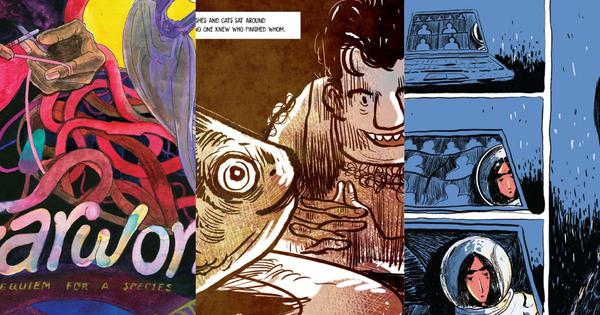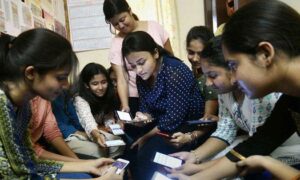
It’s rare that a literary anthology is practically 10 on 10, no notes. I’m speaking of the fantabulous Longform 2025, the third edition of the graphic narratives’ anthology produced by the Kolkata-based Longform Comics Collective. Their idea is to showcase the best and most cutting-edge work in Indian “sequential art”, as described by Will Eisner and later elaborated on by comics theorist Scott McCloud.
Across 18 entries, over 300 pages, Indian artists from various universities, including the National Institute of Design, along with independent contributors, tackle late-stage capitalism, climate change and communal tensions. There are also cats!
Midway, there’s a fabulous interview with journalist-cartoonist Joe Sacco, whose essay on longform comics inspired the collective’s name. The entries also include Santanu Debnath’s beautiful wordless series of paintings that explore the transformation of a village via industrialisation, digitisation and climate.
A new era
The first edition, released in 2018, was a radical statement: here are comics rooted in resistance. By 2022, the second edition had become sharper, more unpredictable, featuring a wide array of voices. The attempt to make a statement has continued with the new edition; most of the contributors are not cis-het men, despite the Longform Comics Collective editors being all men.
Nearly all 18 entries are top-notch. Compiling such a high-quality product is not a mean feat. Kudos to the Collective’s editors Debkumar Mitra, Pinaki De and Argha Manna.
Some of the Collective’s members have been steadfast in their mission to break ground in Indian comics since as far back as the 2010s. Pinaki De, for example, was involved with the short-lived Drighangchoo (2009–10), an English-Bengali graphic narratives magazine published out of Jadavpur University. Comics enthusiasts familiar with it will notice that strain of irreverence, insight and intelligence running through each panel of Longform 2025.
The opener, Text Box: A Graphic Narrative, follows an ageing slogan painter tormented by thoughts of his craft being immaterial in the age of Photoshop, Canva, and… groan… generative AI. Still, he soldiers on until we finally see the writing on the wall: “The World Speaks Many Tongues…”
Anantha Sriya A’s contribution immediately sets the SOP for the collection. That line is a manifesto. There are indeed many ways to see the world and just as many to tell a story, which is what Longform 2025 is attempting to show us.
Avanti Karmakar’s Grief will strike a chord with those who have battled depression through, among other measures, a steadfast routine, constantly aware that grief is a monster that needs vigilance.
Ayisha Shahul’s We Can’t Hear You is a magical take on this-could’ve-been-a-mail. Kratika Sunkar’s mother-daughter sketch Validation has a similar breezy irreverence.
Khushi Chauhan’s religion-themed My Conversation with God moved me deeply. A Brahmin priest diligently follows his father’s footsteps and makes a career out of serving god. But when he loses his loved ones, he loses his faith. He returns to his calling only upon encountering passages from the Bhagavad Gita.
Just recently, a most Leftist friend spoke to me briefly about their life transformed for the better after they got into Gita. I wasn’t convinced, but Chauhan’s chapter could make me see what they meant. It also addressed my subterranean concerns about my ageing parents.
Moienuk Sengupta’s black-red-and-white story Borderliners is a timely reflection on the Bharatiya Janata Party government’s drive to hound out alleged Bangladeshis from India.
Pushing boundaries
Equally political but spanning a far larger timeframe is Priyankar Gupta’s ambitious City of Missing People. The spirit of renegade Bengali author Nabarun Bhattacharya covertly courses through this chapter’s veins. Gupta tackles the condition of the impotent Kolkata bhodrolok through the fall of the Congress government, the rise and fall of the Communists, and the spiritual emptiness of the Trinamool regime. My only complaint: it ends abruptly.
The Laws of the Ancients, Sankha Banerjee’s adaptation of a quite radical episode from the Mahabharat, is impressive.
Pregnancy, and the despair of birthing and losing a child, have inspired two striking stories with extremely literary qualities.
Genesis, written by Gargi Bhattacharya, with art by Subhashis Ghosh and Shan Bhattacharya, touches upon the dread of having a child in what appears to be the “last century of the homo sapiens”, as filmmaker Paul Schrader said some years back. In Sid/Pyre’s Remembering, a depressed woman who has had a miscarriage wonders:
“I drag myself through a hallway of failed mothers.
This warp of my baby is everything I remember of myself.
Nothing but a ripple of horror, drizzling through me, born dead.And dead again…
Anti-mother.
An antithesis of a mother.So why do I still reach for him? Why?”
Didn’t film critic Roger Ebert once say cinema is a machine to generate empathy? After Genesis and Sid/Pyre’s chapter, we can declare the same for sequential art.
I had the most joy reading Snigdha SK’s catsome Feline Wisdom. Subhankar Rai Gupta’s Untitled brings a dash of surprise testosterone to the collection. The self-referential meta nature of this piece reminded me of a very old Alan Moore comic about a cat in panel one communicating with itself in the final panel, discussing the strip’s punchline.
Finally, my favourite: Pratyasha Nath’s Earworm: Requiem for a Species. David Cronenberg would be proud. This is an extremely refreshing and unique body horror story where a young woman is afflicted with a fungal ear infection. Of course, the ramifications are not just spiritual, but ecological and existential. Nath has a master’s degrees in biotechnology and biochemical engineering. As a major fan of warped stories like these, I implore her to never stop creating – and for the Longform Collective to keep pushing boundaries.
Longform 2025: An Anthology of Graphic Narratives, edited by Debkumar Mitra, Pinaki De, and Argha Manna, Penguin India.
This article first appeared on Scroll.in
📰 Crime Today News is proudly sponsored by DRYFRUIT & CO – A Brand by eFabby Global LLC
Design & Developed by Yes Mom Hosting






